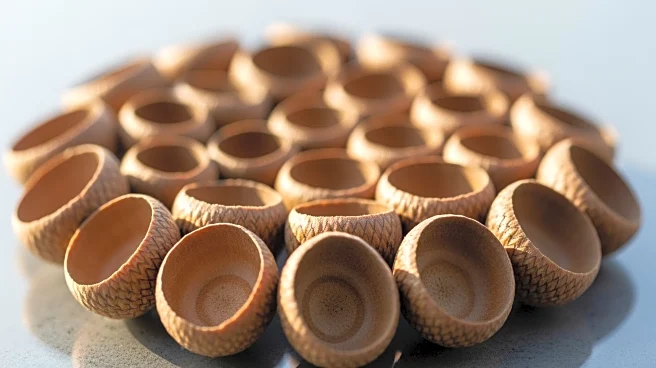What's Happening?
A recent study has explored the use of acorn cups as a carbon source for heterotrophic denitrification, a process that reduces nitrates in water. The research highlights the physicochemical properties
of acorn cups, including their low moisture content and high porosity, which facilitate microbial adhesion and colonization. The study utilized Fourier-transform infrared spectroscopy to confirm the presence of cellulose and starch in the acorn cups, which are crucial for supporting microbial activity. The acorn cups demonstrated a high nitrate removal efficiency, reaching up to 95.38% at lower nitrate concentrations. The study also noted the presence of beneficial trace elements like iron and potassium, which enhance microbial growth and denitrification processes.
Why It's Important?
The findings of this study are significant for water treatment processes, particularly in addressing nitrate contamination, which is a common issue in water supplies. The use of acorn cups as a carbon source offers a sustainable and cost-effective alternative to traditional methods, which often rely on refined carbon compounds. This approach not only reduces reliance on conventional agricultural resources but also valorizes underutilized biomass, potentially leading to more environmentally friendly and economically viable water treatment solutions. The high efficiency of nitrate removal and the stability of the denitrification process under neutral pH conditions make acorn cups a promising option for decentralized or low-maintenance water treatment systems.
What's Next?
Further research is needed to explore the long-term viability and scalability of using acorn cups in real-world water treatment applications. Future studies should focus on material regeneration, reuse, and the long-term degradation of acorn cups. Additionally, continuous-flow and real-world application trials will be necessary to assess the sustained carbon release and durability of this biomaterial. The potential for industrial application remains promising, pending further validation and optimization in larger-scale settings.
Beyond the Headlines
The study underscores the potential of using natural, low-cost materials in environmental management and water purification. By utilizing acorn cups, which are typically considered low-value agricultural residues, this approach not only addresses environmental concerns but also promotes the sustainable use of natural resources. The research highlights the importance of exploring alternative materials that can provide both ecological and economic benefits, paving the way for innovative solutions in water treatment and bioremediation.









